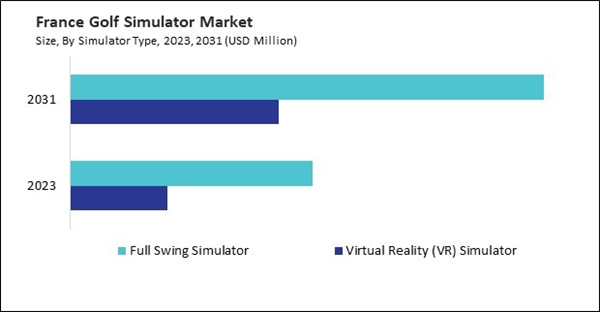The UK market dominated the Europe Golf Simulator Market by country in 2023, and is expected to continue to be a dominant market till 2031; thereby, achieving a market value of $180.1 million by 2031. The Germany market is exhibiting a CAGR of 7.7% during 2024-2031. Additionally, the France market is expected to experience a CAGR of 9.4% during 2024-2031.
Commercially, golf simulators are increasingly integrated into entertainment and hospitality venues such as sports bars, hotels, resorts, and dedicated golf simulation centers. These establishments use simulators to attract customers, offering year-round golfing experiences regardless of weather conditions.
In education and sports training, colleges, universities, and golf academies are adopting simulators to enhance athletic programs. These institutions use the technology to train athletes, analyze swing mechanics, and simulate competitive scenarios, providing a controlled environment for skill development.
The increasing household savings and investment rates and the expanding European video gaming industry contribute to the market's growth. The rise in household savings and investment rates in the EU, particularly in countries like Cyprus (15.2%) and Luxembourg (13.9%), indicates that European consumers are in a strong financial position to spend on premium recreational experiences. With a household investment rate of 10.0% in 2022, there is an increasing tendency to invest in home entertainment solutions, including high-quality simulators. Many individuals and families are now prioritizing in-home entertainment and fitness solutions, creating a growing market for advanced simulators that offer realistic, space-efficient golfing experiences within residential settings. The European gaming industry's expansion is also crucial in shaping the market. With 53% of the population engaging in video gaming and an increasing workforce in the sector, there is a rising familiarity and acceptance of interactive and virtual sports experiences. At 31.4 years old, the average European gamer falls within a demographic with both disposable income and an interest in high-tech gaming innovations. Thus, the combination of higher savings, increased household investments, and the booming gaming industry in Europe creates favorable market conditions.
List of Key Companies Profiled
- aboutGOLF Global, Inc
- FlightScope Golf LLC
- Ernest Sports, Inc.
- Full Swing Golf, Inc.
- GOLFZON
- Red Stakes Golf Club, LLC
- GOLFTEC Enterprises, LLC
- GOLFJOY LIMITED
- X Golf America, Inc.
- Garmin Ltd.
Market Report Segmentation
By Simulator Type
- Virtual Reality (VR) Simulator
- Full Swing Simulator
By Installation Type
- Indoor
- Outdoor
By End Use
- Residential
- Commercial
By Offering
- Hardware
- Software
- Services
By Type
- Portable
- Built-in
- Free Standing
By Country
- Germany
- UK
- France
- Russia
- Spain
- Italy
- Rest of Europe
Table of Contents
Companies Mentioned
- aboutGOLF Global, Inc
- FlightScope Golf LLC
- Ernest Sports, Inc.
- Full Swing Golf, Inc.
- GOLFZON
- Red Stakes Golf Club, LLC
- GOLFTEC Enterprises, LLC
- GOLFJOY LIMITED
- X Golf America, Inc.
- Garmin Ltd.









